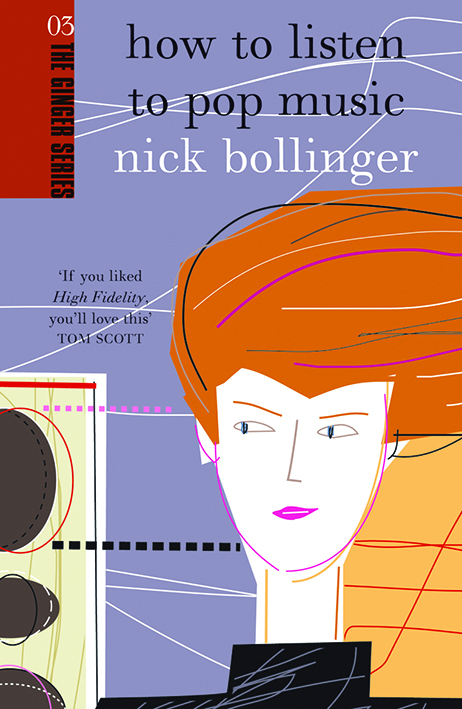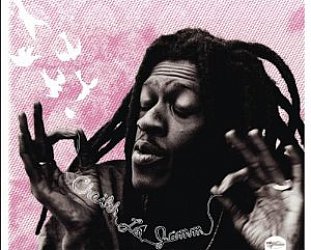Graham Reid | | 5 min read

Recently Bollinger, the voice of National Radio programmes about contemporary music, was on the late shift as he put together his review show The Sampler, and edited an interview for Musical Chairs.
He worked long and late so he could take up a rare opportunity, the bassist in a vaudeville band for Peter Jackson’s movie King Kong.
Then he started a round of promotional interviews for his first book, How to Listen to Pop Music.
Another in the on-going Ginger Series which kicked off with Spiro Zavos’ How to Watch a Game of Rugby, Bollinger’s book is an accessible account of his own growth as a listener from the Beatles‘ Twist and Shout which opened doors to pop magic when he was four.
It also acknowledges how he became a musician with numerous Wellington bands, notably alongside Rick Bryant in Rough Justice, with fellow-postman Bill Lake in the Pelicans, and the long-running Windy City Strugglers -- again with Bryant -- who were in Auckland recently playing on Ponsonby Road.
“They’d put out orange cones in front of these cafes and we were pulling up and serenading the stunned brunchers. But the promoters put a generator on the truck which was making more noise than we were and was slowly poisoning us.
“So after two stops we turned it off and just played acoustically, because we can, we can just busk. I was thumping the upright as hard as I could and Rick was hollering away. You can hear him over anything.”
Bollinger’s musical life dances to a constant soundtrack of fresh songs, old passions and even now wonderful discoveries.
A Listener music writer since 1988, he plays new music constantly while doing other things, but admits when he has downtime he will often revert to the familiar.
 “There’s a sense of relief sometimes when I’ve done my work and I find I’ve got a day or two with no listening. Then I start pulling out old favourites or things I’ve bought I know I’m never going to review.
“There’s a sense of relief sometimes when I’ve done my work and I find I’ve got a day or two with no listening. Then I start pulling out old favourites or things I’ve bought I know I’m never going to review.
“Then there are those albums you keep pulling out long after you’ve written about them and sometimes feel bad didn’t give them a better review, because you are still listening to them.”
Bollinger has spent his life engaged with music of all kinds -- his book traverses innocent 60s pop, music like Lou Reed’s 70s album Berlin which he admits he wasn’t ready for, and nods to world music and his passion for New Orleans’ sounds. But How to Listen to Pop didn’t come easily.
“The editors had given me a word limit and the title, and the first book in the series. It was the first book about rugby I’d ever read, but it inspired me. It took a long time to get started but then I went to Paekakariki for three days to get stuck into it. When I came back I had written a huge chunk of it. I had a solid structure, then it was just editing and adding things.”
He is aware of the biggest danger in writing about pop music.
“It will be out of date immediately if you really are writing about the here and now.
“The stuff I’ve written about in the most depth is that which I’ve listened to for the longest time, and that I have experienced in some way that perhaps I don’t experience anymore, just that naivety and feeling of not knowing where it came from.
“Now I immediately think, where are its antecedents? Who produced this?
“Previously it took me a long time before I used to think about those things, and that discovery process was very exciting. That said, I still get surprises.”
Bollinger -- who lives in Wellington with his partner Kathy, their three daughters, and a substantial record collection -- admits the book might be more fairly titled How I Listen To Pop Music as it charts his life from sitting on his father Conrad’s knee singing from The Fireside Book of Folk Songs.
He tells of saving up pocket money to buy singles, of being a teenage rock snob in the early 70s at Onslow College, and of the difficulties today of reviewing albums from the sheer volume available.
“That is the only honest way you can write about music, you analyse the way you listen and other people can use that as some sort of yardstick. I don’t expect everyone to have the same obsession with New Orleans as I have for example, but that regional thing applies all over the globe and if people hear something that captures their attention it resonates.”
For a music writer who performs -- a rarity among music journalists -- Bollinger says he deliberately avoided writing too much about his playing experiences.
“You can quickly get very technical and I didn’t want it to be like that. I wanted to write about the shared experience of music and for people to go, ‘Yeah, I’ve had that too.’ I wasn’t consciously downplaying it, maybe sub-consciously I was.”
He has catholic tastes but acknowledges there is some music he, like everyone, might never appreciate: “It’s easy to dismiss stuff but the problem might be with you and not with the music. Or you might never get it because it might not be meant for you.”
He also steers a course between the jaded who believe music today is not as good as it was so have stopped listening, and the elitists.
“The hipper-than-thou school says if you are not into such’n’such then you don’t know what music is about. That’s not true either.”
While he inevitably weaves in local music he takes a global view noting that “New Zealand music is a little bit of the world, you can’t distort the lens and pretend its more important than it is. You can write books to cover it specifically, but this wasn’t that kind of book.”
Absent from his book -- which covers the role of producers, a potted history of pop, and offers a guide to music jargon -- is the great swathe of pop by boy bands, and Britney Spears.
“Yes, Britney is the epitome of pop and it’s very good, some of it. A long time ago I guess I latched onto ‘authenticity’, when I discovered blues, and that became important to me. It’s a kind of snobbery, but for whatever reason that’s an element that moves me more deeply.
“I enjoy hearing a Britney song, but it can never be that important to me and the things I wrote about tended to be. I felt it was better to write about what I was passionate about.”
And that passion for music of many persuasions might not have taken him to a career in the Post Office but there have been personal payoffs other than living with an ever-changing soundtrack.
“I’ve spent a lot more time with my kids than I would have if I’d been in an office. Certainly the last few years have stood still economically,” he laughs, “but I think I’ll keep doing some version of this. I love it.”





post a comment